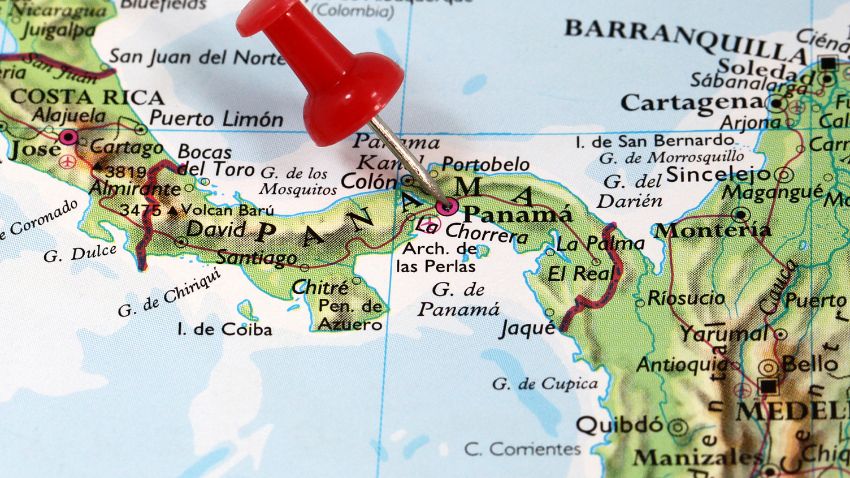Best Cities To Live In Mexico In 2026
Mexico remains one of Latin America’s most compelling destinations, especially for North Americans. More than a million expats call it home, and tens...

13 min read
Protection, management and succession of property is not a modern concept. Throughout centuries, several civilizations have come up with means to secure their wealth and pass it on to their descendants. The Roman Emperor Augustus Caesar was a pioneer in the asset management sector, thanks to the Fiducia or fideicomiso. Panama continues with this tradition and has proven itself to be one of the best places in the world to protect assets. Today we will discuss one of my favourite wealth protection vehicles, the Panama Private Interest Foundation (PPIF).
The Panama Private Interest Foundation is a legal entity established under Panamanian law that serves as a versatile and effective tool for asset protection, estate planning, and wealth management. It functions similarly to a company or corporation but with distinct advantages and differences. Unlike traditional corporations, a Panama Private Interest Foundation does not have shareholders or owners. Instead, it has a foundation council that manages the foundation's assets and carries out its objectives.
The Panama Private Interest Foundation, often referred to simply as a Panama Foundation, is a legal entity that has gained recognition as an effective and legitimate tool for various purposes, both domestically and internationally. These entities have become increasingly popular due to their flexibility and the advantages they offer.
One of the key features of Panamanian foundations is their ability to provide a high level of secrecy and confidentiality. Panama has a long history of respecting financial privacy, making it a favorable jurisdiction for individuals and entities looking to safeguard their assets and financial affairs from unwanted influence or prying eyes. This secrecy element is particularly attractive to those seeking discretion in their financial matters.
In the Middle Ages, if crusade knights died in combat, they could previously transfer their assets to a specific individual who would give them to children and spouses. Later, the British created Trusts and, with the impact of the French Revolution, Foundations came into existence. Foundations became widely accepted in Europe, firstly for non-profit, charitable purposes. However, some countries, like the Principality of Liechtenstein, passed a law for private foundations that would not be of public or social interest. Switzerland, Luxembourg and the Cayman Islands are other popular jurisdictions for establishing Foundations. By the end of the last century, Panama combined the best of the Common and Civil Law worlds by approving Law 25 on June 12, 1995. Apart from offering an offshore Foundation, the country enjoys political and economic stability, and the government has a pro-business policy. Panama is one of the strongest economies in Latin America.
Panamanian foundations also offer a straightforward process for establishment. With the assistance of legal experts, setting up a Panama Foundation can be a relatively quick and hassle-free procedure. The foundation can be created with a simple document known as the Foundation Charter, which outlines its objectives, beneficiaries, and governing rules.
Furthermore, Panama foundations are flexible in their purposes, allowing them to be used for a wide range of activities. While they cannot engage in commercial business activities, they can hold and manage assets, investments, and properties. This versatility makes them a useful tool for wealth management, estate planning, and charitable endeavors.
Another advantage is the way Panama foundations can distribute profits. They are not subject to taxation on profits generated outside of Panama, which can result in significant tax savings for individuals or entities that set up and operate these foundations.

Maintenance and administration of a Panama Private Interest Foundation can be simplified and cost-effective
Firstly, we must consider article 39 of the Constitution of Panama, which is the first of the two legal pillars that support the existence of this Foundation structure. In essence, this article allows Companies and Foundations to be formed and given juridical personality, as long as they are not contrary to public order and good morals. For that reason, organizations that promote racial discrimination or the superiority of an ethnic group or race will not be eligible for accreditation. The second pillar is Law 25, the Foundation Charter, and the Regulations or By-Laws mentioned in Article 2.
Like other Foundations, a Panamanian Private Interest Foundation consists of an individual (or a legal person) founding another legal person who will receive assets, and, successively, the latter is in charge of the management and administration of them for the sake of the beneficiaries of the Founder appointed. Both the public document called Foundation Charter and the private one called Regulations or By-Laws define the whole structure.
One of the key advantages of a Panama Private Interest Foundation is its high level of privacy and security. The foundation's assets are legally separated from the personal assets of the foundation council members and beneficiaries, providing an added layer of protection. The confidentiality of the foundation's affairs is safeguarded, as Panama does not require public disclosure of the names of foundation owners or beneficiaries.
Other relevant agents are the Council and the protector. The former administers the property in compliance with the provisions of the Foundation’s Documents, while the latter ensures the Foundation strictly works towards its purpose and protects the interest of beneficiaries.
Put simply, the steps to set up this legal vehicle are the following:
Once the beneficiary receives his assigned property, the Foundation terminates. Therefore, a founder donates assets to a Foundation for the realization of a purpose. All assets, then, belong to the Foundation, and the founder does not own them anymore.

Panama City - One of the key advantages of a Panama Private Interest Foundation is its high level of privacy and security
Assets are the tangible or intangible, personal or actual property the Foundation receives to pursue its purpose. For example, bank accounts, real estate and shares are examples of assets;
Private Interest means that the Foundation works for the benefit of a legal person (individual, corporation, charity or family) without the intervention of the State or third parties;
Non-profit means this type of foundation does not have financial gain as its primary objective. In other words, in principle, it must benefit society, but later on, we will mention the commercial activities in which a PPIF can get involved;
The Organization is the role assigned to each agent in the Foundation.
Another crucial aspect is that, through a Foundation, the founder can create a living will to distribute and use his or her estate as he/she wishes to during his or her last days. Legally speaking, the Foundation is a legal person, meaning it can acquire property and loans, sign agreements, etc. Article 38 of the Civil Code states that legal persons can be political, public, religious or commercial organizations that at least one capable individual can represent. By capable, Article 297 of the Civil code refers to individuals who are not insane, deaf, dumb or minors. The deaf and dumb can be founders if they receive proper instruction and can both express their will and understand someone else’s.
By virtue of Article 1 of Law 25, a founder might be a natural, legal or third person. The first one is the most usual. The second one is a corporation or association, and it is ideal when creating more confidential organizations. The third one provides more confidentiality and protection and it is commonly referred to as a Nominal Founder. This last one is a bit trickier and care must be taken when choosing this category.
Maintenance and administration of a Panama Private Interest Foundation can be simplified and cost-effective. The foundation can hold various types of assets, including real estate, bank accounts, investments, and intellectual property. It can also engage in commercial activities, conduct business transactions, and receive donations. The foundation can be managed from an office anywhere in the world, making it a flexible and convenient option for international asset management.
Panama Private Interest Foundations can also serve philanthropic objectives. They can receive donations and distribute funds to charitable institutions, ensuring that your wealth can be used for the greater good. Additionally, the foundation can be a vehicle for succession planning, allowing for the seamless transfer of assets to beneficiaries according to the wishes of the founder.

You can rest easy knowing your assets are safe and properly secured.
In other articles, we discussed the amount of control and flexibility a Trust of a Foundation can provide a Founder. Panamanian Private Interest Foundations are no exception.
The founder can determine the rights, obligations and restrictions every agent belonging to the organization has. This implies excellent control of the policies;
He or she can get his property back as long as it is stipulated in the act of transfer of property. See Article12 of Law 25;
According to Article 7, Law 25, the founder can amend the Foundation’s documents;
By definition, the founder can keep his or her property separated from that of the Foundation;
The founder can reverse the establishment of the Foundation as long as the Foundation Charter stipulates it;
The founder can appoint and dismiss Council members. Moreover, he or she can name professionals (attorneys, accountants, bankers, etc.) to guarantee the Foundation is working for its purpose.
The founder’s first obligation is the transfer of assets to the Panamanian Private Interest Foundation when registering the Foundation Charter in the Public Registry. This document, in combination with the Regulations, might dictate other responsibilities and boundaries.
Related article: The Basics of How To Get a Second Passport Or a Second Residency.

Panama foundations are flexible in their purposes, allowing them to be used for a wide range of activities
The Foundation Council is the organ that manages assets for a purpose, complies with the Foundation charter and the Regulations, and keeps healthy relationships with other organizations and the State. There are two types of Foundation Councils. The first one is a group of at least three people: the President, Treasurer and Secretary. The Founder can also be a representative or administrator of the Foundation. The second one is a legal person, either a foreign or national juridical person, that has the role of an administrator.
Even though the Council enjoys flexibility in terms of its limitations and obligations, Article 18 of Law 25 puts in place some rules. Some of these are administering the property the foundation is supplied with, rendering annual reports to the beneficiaries and giving them their part of the property that the Foundation’s documents stipulate, and signing agreements in the name of the Foundation. The Council has virtually no rights, but, usually, they get paid for their services.
It's important to note that the political influence of Panama and its commitment to international regulations have led to increased transparency and a shift towards more compliance. This means that while Panama foundations offer secrecy, they must also adhere to international standards to prevent their misuse for illegal purposes.
They are the persons benefiting partly or completely from the Foundation’s assets. In practice, they must be capable of administering property or at least having proper legal representation. There are two types of beneficiaries. The first one is family members, while the second one is any person outside of the family, such as friends, companies, charity, etc. One major advantage of Panamanian Private Interest Foundations is that the Founder can be a beneficiary. Therefore, the Founder might be both a Council member and a beneficiary.
The beneficiaries are granted various rights such as prosecuting the Foundation Council in case of negligence, removing the Foundation Council in case of conflict of interests, denouncing actions contrary to the Foundation’s documents, and exemption of Real Estate transfer tax (only if the transaction is between father and descendant or vice-versa, or between spouses).

Expats living in Panama can take advantage of the healthcare system to access top-notch services at an affordable price
This agent ensures that the Foundation is working towards its proper purpose, complies with its rules, and is providing each beneficiary with their part. The Founder can hire unlimited protectors. This figure can be a natural or legal person, national or foreign, or professional or corporation. In practice, there usually exist supervisory bodies in charge of specific tasks. In other words, the Law lays out a solid system of checks and balances within the Foundation.
According to Article 24, the protector’s powers are:
Ensuring the fulfillment of the purposes;
Regulating and approving the Council’s activities;
Demanding accounts by the Council;
Protecting the interests and rights of beneficiaries;
Appointing new Council members;
Changing the purposes if they are not achievable;
And if stipulated, modifying the beneficiaries and taking care of the property.
As in the case of the Council, the Protector could not get paid for his or her services. However, in practice, they do receive a monthly or annual fee, a commission on the transfer of property or simply an in-advance payment. The Foundation’s Regulations shall establish the particular economic conditions.
Related content: What Is Life Like In Panama?

Panama Private Interest Foundation is a powerful legal entity that offers significant advantages in terms of privacy, security, and flexibility
This actor must be either a licensed attorney or a law firm within the Public Registry. His or her chief task is composing the Foundation’s legal documentation. As the name suggests, he or she must reside in Panama.
Its rights are:
The annual fee for services;
Payment for any legal procedure after the creation of the Foundation, such as opening bank accounts, registering power of attorney, etc;
Payment for drafting, approval and registration of the Foundation;
Payment for special services (taking care of emails or phone calls, or being a nominal founder).
Its responsibilities are:
Knowing its client deeply, keeping sufficient information about them, and communicating it to the Panamanian authorities when an investigation is conducted against the Foundation;
Keeping up to date about any judicial action against the Foundation within Panama;
Understanding the actors who belong to the organization of a Panamanian Private Interest Foundation.

The foundation can be a vehicle for succession planning, allowing for the seamless transfer of assets to beneficiaries according to the wishes of the founder
These are crucial aspects to keep in mind when establishing a Foundation. Firstly, revocability allows the founder to cancel the creation of the Panamanian Private Interest Foundation and get back his or her assets. Although these actions are normally irrevocable, it is not the case if the Foundation is created for testamentary purposes.
The founder can ensure revocability if:
He or she lays out how to revoke within the documentation;
The Public Registry has not filed the foundation charter;
The Foundation does not fulfill the purposes that the Founder created the Foundation for;
The Foundation Council commits a crime against the founder.
Secondly, despite its non-profit nature (Article 3), a Panamanian Private Interest Foundation can manage to perform profitable activities. For example, if it performs an occasional activity, the Foundation will not be regarded as a professional or merchant. In the case of owning shares, the Foundation must dedicate them to the attainment of its original purpose. As a shareholder, it can take advantage of its rights such as managing, controlling and making decisions about the business.
Thirdly, it is illegal to disclose information about the Foundation’s activities, operations, or members. Article 35 stipulates that the infringement of this will require the culprit to pay a $50,000 fine and stay 6 months in jail. As mentioned before, the Foundation charter is a public document, whereas the Regulations are private. Therefore, it is possible to keep internal rules secret. Even though the Charter is publicly available, its information can stay private by appointing nominee founders or council members in the foundation’s organization. It is worth mentioning that although the foundation is not a Private Will, the founder may define an inheritance plan to benefit his or her heirs or persons of his or her choice. According to Article 13, forced heirship does not apply to Panamanian Private Interest Foundations, and heirs cannot impede the creation of the Foundation or transfers.

The foundation can be managed from an office anywhere in the world
We have previously discussed that the Council and Protector do not have the right to claim remuneration for their services. However, in practice, they normally get paid as they do a very complex job. Let us briefly discover the costs involved when creating a foundation.
Creation and Documentation require lots of specialized knowledge, so it is advisable to hire competent professionals who will handle every step carefully. There exist minimum fees, but the fees vary depending on the lawyer’s reputation, experience, time to carry out everything, and responsibility;
Management costs are optional, as indicated before, but in practice, they take place. Only the Regulations determine if managers get paid;
Services such as opening accounts in the name of the Foundation also require specialized knowledge;
In terms of taxes, Article 27 stipulates that taxes (and contribution, liens or imposts) shall not apply in the acts of creation, modification and extinction, or acts of transfer, transmittal or encumbrance of assets and the income derived from the Foundation’s activities. This is the case if the assets are:
Located abroad;
Money deposited by natural or legal persons who get their income abroad or tax-exempt income in Panama;
Shares or securities of companies whose income is not Panama-sourced or tax-exempt income generated in Panama.
The transfer of immovable property, titles, certificates of deposits, shares or money dedicated to the foundation’s purpose or arising from the extinction are not taxable if the beneficiary is a relative within the first degree of consanguinity or the founder’s spouse.
It is important to note that all documents that need to be filed with the Public Registry must be in any language with Latin script. Moreover, the foundation name must have the word "foundation" in any language, Latin characters, and must not have another’s Panamanian Private Interest Foundation name. And now, let us list the foundation’s documents and the information contained therein.
Power of attorney is a document that allows the founder to concede legal authority to an advisor who will take care of the acts of creation, drafting, registration or management. (Although it isn’t needed for the foundation, you would still need to follow these guidelines when getting a power of attorney);
The Foundation Charter is the chief document comprising all basic data of the Foundation, including name, duration, council, etc;
The Regulations are the secondary document containing the name of the beneficiaries or asset distribution policies;
The Council's Resolution informs about the Council's performance in terms of asset management and other duties;
The Reports share information about some members and explain the activities the foundation gets involved in or the benefits the foundation receives;
The Appointment documents reflect who is chosen to perform a specific task;
The Documents of no-responsibility free some members from any consequences of the acts of the foundations and any obligation towards third parties;
The Documents of due diligence, issued by a resident agent, contain information about the person willing to set up a Panamanian Private Interest Foundation.
The Foundation Charter must include:
Name of the foundation;
Initial patrimony (at least $10,000, but it can be expressed in any currency);
Council: names and addresses of the members and its address;
Domicile (in Panama or overseas);
Resident Agent’s name and address;
Purposes or objects;
Manner of appointing beneficiaries;
Amendments: policies to modify the Charter. One of the members of the Foundation has the right to modify it;
Duration: limited or unlimited;
Assets: manner of their distribution;
Liquidation: manner to liquidate and dissolve once the purposes have been attained.
Some extra clauses are the appointment of protectors and legal representatives or the dismissal of the Council members. The procedure to amend the Foundation Charter must comply with the Foundation Charter’s provisions, but Article 7 of Law 25 states the requirements to do this. The Charter’s resolutions must appear in a written document that must also contain the date of performance. These must specify who signs the document and certifies the amendment, and finally, a notary must authenticate the signatures.
In contrast, Law 25 does not determine the contents the Regulations must contain, but usually, the clauses are, among others, the following:
Names and addresses of the Foundation’s beneficiaries;
The assets the foundation owns;
The manner of distributing assets to each beneficiary;
The powers and limitations of the Council and Founder;
The manner to amend the regulations;
The appointment of new beneficiaries.
Consequently, only the Regulations or the Foundation Charter determine how the regulations shall change. The founder shall dictate the minimum books the Panamanian Private Interest Foundation must keep, but the mandatory one is the Charter or Minutes book, which contains the most relevant information about a corporation and its history (for instance, articles of incorporation, resolutions, and consents).
Related content: The Top Four Visas For Moving To Panama

The foundation can hold various types of assets, including real estate, bank accounts, investments, and intellectual property
A Panamanian Private Interest Foundation may pursue various purposes as long as they are of non-profit nature. Some examples are:
A Foundation Mortis Causa with Private Effects is for testamentary purposes and comes into existence upon the founder’s demise. It is a common practice that the Founder puts himself or herself as the first beneficiary until his or her death when the assets are distributed and managed according to his or her instructions;
A Foundation Inter Vivos with Private Effect can be for a myriad of purposes. Like other Trusts and Foundations, it is usual to use it to support a family. A Panamanian Private Interest Foundation might provide food, shelter, clothing, transportation, etc. The family benefiting from this must not necessarily be the founder’s family. It can have education, life rent, tax and asset protection and management purposes;
A Foundation Inter vivos or Mortis Causa with Public Effects is for charitable and general interest purposes;
A Foundation Inter vivos or Mortis Causa with Administrative and Financial Effects can be for a myriad of purposes. For example, it is useful for capturing and administering capitals and titles, being a guarantee or insurance management.
As you can appreciate, a Panamanian Private Interest Foundation possesses many positive characteristics such as flexibility, privacy and tax benefits. Despite its non-profit nature, it is possible to use it for personal purposes such as holding property, planning one’s estate, and taking care of a family. On top of that, the Founder enjoys a great deal of liberty of privacy and control over the governing bodies and actors involved. Panamanian Private Interest Foundations are proof of Panama’s economic and political stability and its business-friendly environment.
In summary, the Panama Private Interest Foundation is a powerful legal entity that offers significant advantages in terms of privacy, security, and flexibility. It provides a robust framework for asset protection, estate planning, and charitable giving. With the ability to hold various assets and conduct business activities, a Panama Private Interest Foundation can be an invaluable tool for individuals and families seeking comprehensive wealth management and protection.
If you want the best intel from the expat world, including profitable offshore opportunities, little-known tax-saving strategies, and hard-won insights on immigration, passports, and Plan-B residencies, all delivered to your inbox every single week, then join our daily correspondence, EMS Pulse®. Currently enjoyed by over 84,000 expats and expat-hopefuls worldwide. Fill in the form below to join our newsletter free:

Written by Mikkel Thorup
Mikkel Thorup is the world’s most sought-after expat consultant. He focuses on helping high-net-worth private clients to legally mitigate tax liabilities, obtain a second residency and citizenship, and assemble a portfolio of foreign investments including international real estate, timber plantations, agricultural land and other hard-money tangible assets. Mikkel is the Founder and CEO at Expat Money®, a private consulting firm started in 2017. He hosts the popular weekly podcast, the Expat Money Show, and wrote the definitive #1-Best Selling book Expat Secrets - How To Pay Zero Taxes, Live Overseas And Make Giant Piles Of Money, and his second book: Expats Guide On Moving To Mexico.

Mexico remains one of Latin America’s most compelling destinations, especially for North Americans. More than a million expats call it home, and tens...

South Korea is far more than K-pop and K-dramas. It is a country known for outstanding food, from bustling street markets to high-end dining, as well...

Asia is one of the most fascinating regions in the world for travel, offering an extraordinary mix of cultures, histories, and landscapes. From...